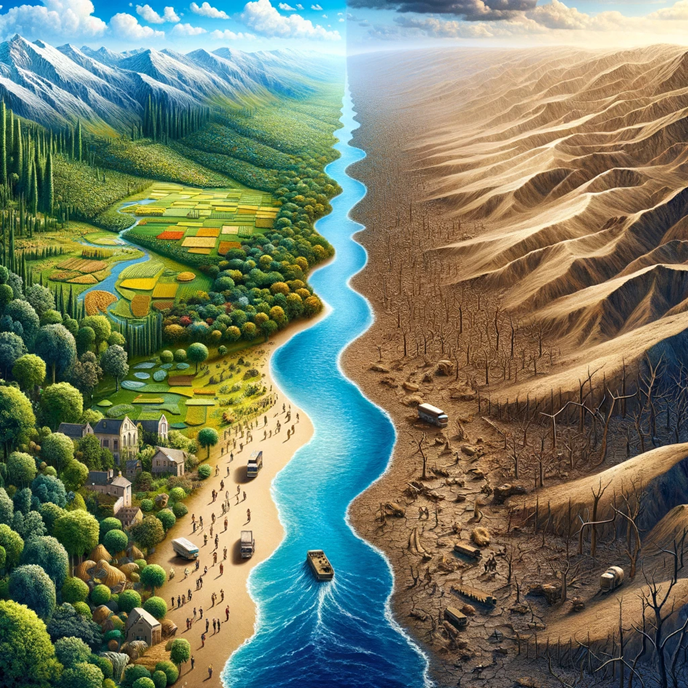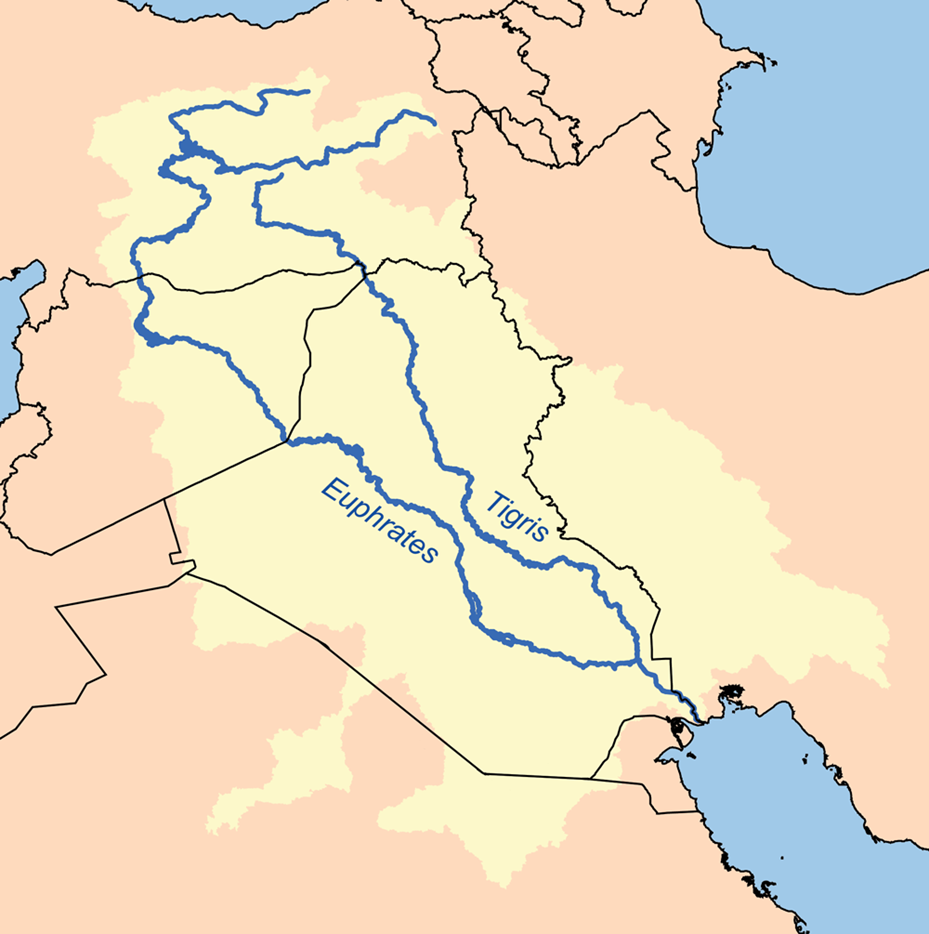Geography is destiny.
—Abraham Verghese
You already know this: water is life.
It’s critical to our existence.
If there’s no water, there can be no food, no community, and no civilisation.
Here’s why it matters:
- Europe has plenty of rainfall. The average annual precipitation in countries like the UK and France ranges from 800mm to 1,100mm.
- Meanwhile, by comparison, the Middle East has very little rainfall. The average in countries like Iraq and Iran remains stuck around the 200mm mark.
- What are the consequences of this? Well, incredibly profound.

Source: Image generated by Open-AI’s DALL-E
Because of water, the contrast between European and Middle Eastern societies couldn’t be sharper. The difference is as clear as night and day. However, a lot of the coverage that we see in the media today seems to completely ignore this:
- For example, some voices on the Right say that European civilisation has flourished because of Judeo-Christian values and Greco-Roman democracy. This is the golden combination. Therefore, if the people in the Middle East can stop being so stubborn and embrace these ideals, they too will enjoy peace and progress.
- Meanwhile, some voices on the Left say that the Middle East is tyrannical and fractured because of European colonialism. This legacy of exploitation stretches back centuries. Therefore, the West is to be blamed entirely for the region’s problems and should be held to account.
Yes, these voices are ideological, aren’t they? They tend to deliver angertainment. But the truth is actually far more complicated. Here’s why:
- To get a better understanding of the Middle East, you will need to look closely at the terrain. In particular, you will need to look at main sources of water there — the Tigris and Euphrates rivers.
- These waterways originate from Turkey, then flow through Syria and Iraq before emptying into the Persian Gulf.
- They form what is known as a basin. This is a highly concentrated resource that’s very limited and very localised.

Source: Wikimedia Commons
Given the severe lack of rainfall in this region, competition for access to the Tigris-Euphrates has been fierce across the centuries:
- Early empires like the Assyrians and Babylonians have emerged in this area. Building up fortress cities. Jealously guarding access to the waterways. This mindset of scarcity has shaped the culture of the land.
- It has given rise to what is known as ‘hydraulic despotism’ — governments that dominate the region by having a monopoly on water.
- What was true millennia ago is still true today. A combination of authoritarian control, tribal rivalries, and nomadic lifestyles have created a tinderbox of constant tension. All this serves to undermine democratic principles of fair use and equality in this region.
- Because of this, it’s not civil society that regulates behaviour in the Middle East. Instead, it’s the doctrine of might makes right.
Yes, people often call this place the Cradle of Civilisation. It sounds romantic and grand:
- But put away your rose-tinted glass. Study the facts on the ground. See them for what they are. And you will realise that the Tigris-Euphrates is also the ancient birthplace of fanatics, assassins, and terrorists.
- And why not? Shedding blood to get access to water is a way of life here. Not even the discovery of Middle Eastern oil in 1908 could reform centuries of deeply embedded social angst.
- If anything, the production of oil may have only accelerated age-old arguments. For instance, who actually wields desert power in the Middle East? Who has a stronger hold over the waterways? Who wins because of geography?
So, in conclusion, I’ll leave you with this parting thought:
- If you’re reading this, chances are, you’re living in a region where access to water is relatively easy. You’ve never given much thought to who controls it or why. In fact, you pretty much take rainfall for granted.
- Because of this, you may have strong ideals about what democracy means and what it can achieve. No doubt, you have strong opinions about fairness, justice, and integrity.
- But ask yourself: what if you grew up in a land where, historically, water was so scarce, there was no choice but to weaponise it? What if the experiences of your parents and grandparents have been shaped by the geopolitics of water?
- Ask yourself: what would you do to gain access to water? How far would you go? And what kind of moral compromises might you be willing to make?
If you have already reviewed us on Trustpilot, why not review us on Google?
Your prosperity is our focus — which is why we are always working hard to uncover new opportunities beyond the radar for you. We’re eager for your feedback:
- If you have enjoyed this article, please consider leaving us a review.
- Let us know what you liked. Let us know what inspired you. Let us know if it’s made you a better investor.
Regards,
John Ling
Analyst, Wealth Morning
(This article is the author’s personal opinion and commentary only. It is general in nature and should not be construed as any financial or investment advice. Wealth Morning offers Managed Account Services for Wholesale or Eligible investors as defined in the Financial Markets Conduct Act 2013.)





John is the Chief Investment Officer at Wealth Morning. His responsibilities include trading, client service, and compliance. He is an experienced investor and portfolio manager, trading both on his own account and assisting with high net-worth clients. In addition to contributing financial and geopolitical articles to this site, John is a bestselling author in his own right. His international thrillers have appeared on the USA Today and Amazon bestseller lists.